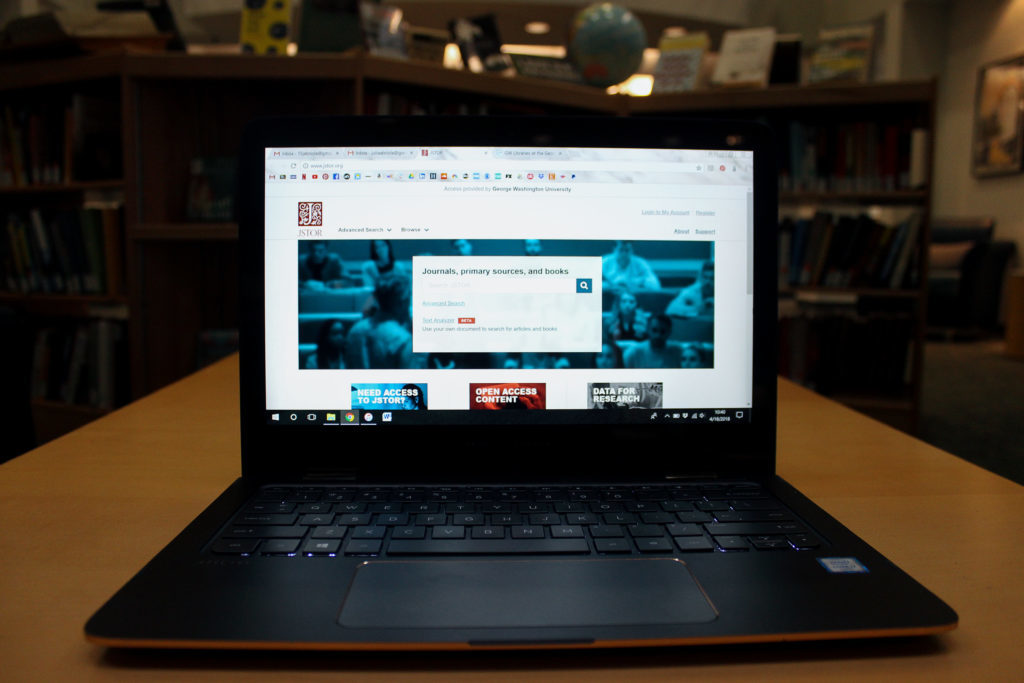GW’s libraries need more funding to compete with library systems at top-tier research universities, according to a new faculty report.
The Faculty Senate library committee released its annual report last week asking the University to replace funds lost from changing the automatic yearly $100 library gift to an opt-in program – a move the report called “ruinous.” Library officials and experts said libraries nationwide continue to face budgetary pressure from rising journal costs, but a well-funded library is crucial for GW to elevate its research profile.
Gelman Library will lose an estimated $1.2 million, and the Himmelfarb Health Sciences and Jacob Burns Law libraries will lose about $200,000 in total when the University allows students to opt into the fee, according to the report. Officials said they will supply an extra $675,000 to all libraries over the next four years to fill the gap in funding – but the committee said it won’t be enough.
The additional funds will cover less than half of the projected losses from the policy change, according to the report.
Of the 10 faculty members on the Faculty Senate library committee, seven declined to comment and three did not return multiple requests to comment.
Geneva Henry, the dean of libraries and academic innovation, said libraries across the country are facing financial constraints because of the rapid inflation of journal costs and budget cuts.
“Top-tier research libraries are critical resources for faculty and students as cutting-edge research relies on access to the best scholarship,” Henry said in an email. “However, for several years, research libraries nationally have been facing significant budget pressure because of substantial inflation on journal and database subscriptions.”
She said it won’t be clear until next semester how much money the libraries will actually lose when the fee becomes opt-in, but officials expect that between 50 and 75 percent of students who previously donated will have to continue donating through the opt-in system next academic year to sustain the libraries budget. To encourage donations, Henry said the library will host a “Support Your Library Day” Wednesday to showcase the impact of the student gift on the library system. For faculty, the library will make individual department reports on the status of the library’s funding, she said.
The faculty committee’s report includes a copy of a 2013 study that found the library wasn’t receiving enough funding and needed more space, but the committee said last week that there has been “little significant follow-up” to the recommendations in that report. Henry said in January that officials were conducting a space study with the goal of making Gelman less crowded.
GW falls behind six of its 12 peer schools in its library expenditures, a shortcoming which cannot be made up with access to the nearby Library of Congress or lending from a consortium, according to the report.
“There is no substitute for building a strong collection if we want to be, and be perceived as, a leading research University,” the report states.
University President Thomas LeBlanc has said from the beginning of his time at GW that one of his main goals is to ensure GW is a globally recognized research university.
Henry said because an increasing number of students and faculty need journal subscriptions and students can’t access all of the resources they need from the Washington Research Library Consortium, which allows students and faculty to borrow books and materials from other universities in the group.
Journal subscription costs have risen more than 100 percent over the past 10 years, according to library research that Henry presented to the Faculty Senate last summer. At the time, faculty said they rely on journal subscriptions to craft classroom assignments and conduct research.
“We are always happy to communicate more with faculty and look forward to implementing both recommendations,” Henry said.
Mary Jane Petrowski, the associate director of the library advocacy group Association of College and Research Libraries, said libraries must ask for more funding to keep up with inflation rates that have worsened due to rising costs of digital subscriptions.
“If you don’t ask for more resources, there’s no way you can have any purchasing power,” she said.
She said libraries often slash staffing when budgets are cut, which can hurt students and faculty. Staff can help faculty comply with the federal standards about making their research available and can help students learn about topics like information literacy.
“Without funding, staffing suffers, they can’t hire the expertise they need,” she said.
Heather Joseph, the executive director of the Scholarly Publishing and Academic Resources Coalition, an organization that advocates for open access to scholarship, said if GW is trying to become a more research-intensive university, cutting funding from libraries works against that goal.
Scientific journals are typically a library’s biggest expense, she said, but they provide crucial context about what research has been done and can help define the goals of current research.
“Libraries are the lifeblood of active research,” she said.




